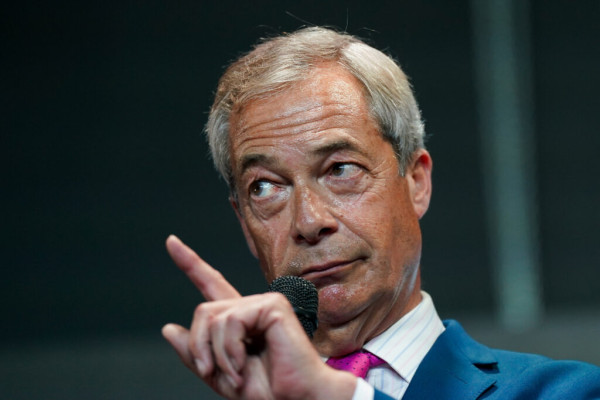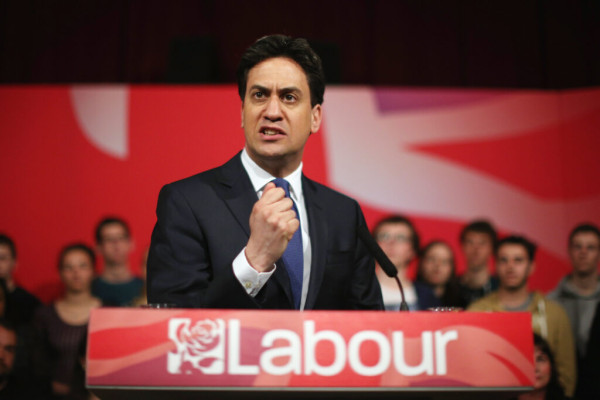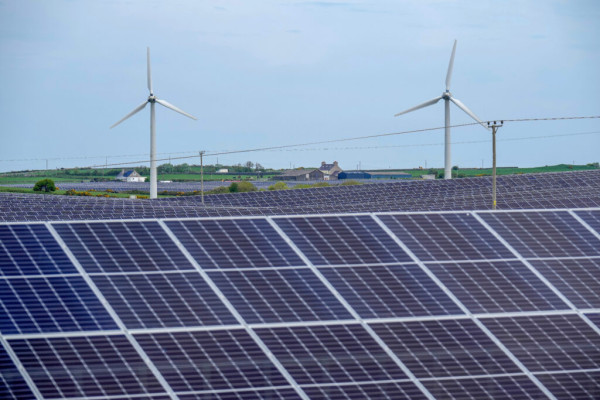Starmer’s ‘quiet’ climate radicalism sets up battle with Farage
LONDON — Early last year, U.K. Labour leader Keir Starmer’s top green lieutenant traveled to Berlin. He was there to take notes on a German government full of climate vim.
Starmer’s man Ed Miliband — then in opposition, now the U.K. energy secretary — encountered a governing coalition of greens, socialists and liberals buoyantly pursuing a set of world-leading climate reforms that reached far into the lives of everyday Germans.
Just a few months later, all that confidence lay in ruins.
The far right party Alternative for Germany (AfD) had leapt on a bungle that became the political sensation of last summer: a law effectively banning the installation of gas boilers from 2024 onwards, announced with little warning to the public.
A series of further embarrassing and damaging green policy retreats would follow. Riding the coattails of a chunk of the German electorate increasingly concerned about the impact of net zero on their day-to-day lives, in June this year the AfD finished second in EU elections, ahead of all three coalition parties.
The German implosion has become a byword for the political danger lying in wait for would-be climate champions — and a warning in particular for Starmer, who swept into Downing Street in Thursday’s election promising to return the U.K. to the forefront of the fight against global warming.
“The work of change begins immediately,” said Starmer in his first speech as prime minister on Friday, championing “the opportunity of clean British power” as a core policy for his new government.
The prime minister is betting he can wash away the cynicism driving Brits to vote for tub-thumpers and climate naysayers. Yet Nigel Farage’s Reform Party, which wants to “scrap” net zero, emerged from last week’s election with five MPs and the backing of millions of voters. Farage’s new movement came second in nearly 90 Labour-held seats.
The U.K.’s newly established ruling party is alive to the risk — errors in Germany “opened up territory for the far right to attack ‘eco-dictatorship’ with some of its net zero policies,” wrote Starmer's ally and biographer Tom Baldwin shortly after the election.
Starmer’s strategy for taking on the threat, according to conversations with Labour insiders and people familiar with party planning, is to tell a new national story, one about a Britain with the confidence to take on nation-building projects again.
'Seismic'
On Friday morning, as the scale of victory became clear, Miliband — who 16 years ago as energy secretary in the last Labour government introduced the U.K.’s Climate Change Act — said the party had again secured a “seismic mandate for change.”
But Starmer faces a British public jaded by years of mismanagement in the public realm, from the failure to finish the HS2 railway to the inability to fix potholes. Voters are also nervous, during a stubbornly enduring cost-of-living crisis, about anything that might further squeeze household budgets. In Farage, a proven political disruptor, Starmer confronts someone who sees net zero — the jargon for the U.K.’s goal to end its contribution to carbon emissions by 2050 — as prime fodder for a fight every bit as vitriolic as immigration and Brexit.

“Nigel Farage is the opposition. They’ve taken out the Tories. They want us next,” said one Labour MP the morning after the election, granted anonymity to speak candidly.
During the campaign, Farage told POLITICO that Labour’s clean power targets would “come at a hideous cost, with massive government borrowing and increased bills for everybody.”
The Reform leader, who was elected to the seaside constituency of Clacton, an hour and a half’s train ride east of London, said: “We will be a voice in parliament for that. We’ll no doubt be a small minority, just as we were on leaving the European Union. But that doesn’t mean that the general public won’t find what we have to say very, very interesting indeed.”
Starmer may choose to pursue a green revolution as the best riposte to this challenge. But if he gets it wrong, it could consume him.
“The legitimacy for our governing project comes from tackling the climate crisis in a way that tackles the cost of living crisis,” said a Labour official, who was granted anonymity as they were not authorized to speak publicly. “There’s a huge fight on, we recognize that.”
But Starmer’s climate offer can appear confusingly double-sided. In February, he and then Shadow Chancellor Rachel Reeves slashed billions from Labour’s green spending plans, a caution which sits uneasily alongside the need to enrol the public in a vision of green renewal.
He’s betting that this duality matches the mood of the British people, who feel burned out but may yet retain the capacity for something bold.
Reassurance, please
Labour’s storming victory this month, securing the biggest majority since the days of Tony Blair, seemingly delivers a mandate for Starmer’s program.
But the travails of the German government — which have extended to green politics in other parts of the EU — have taught Labour three golden rules for governing the green transition, according to party insiders and their confidants. Don’t herd voters toward a sudden cliff-edge that limits their choices, do everything you can to avoid heaping costs on households — and, whatever you do, don’t mess up.
Labour will need to “reassure people that the thing that is good for the environment is also going to be good for their household,” said Sam Alvis, director of energy at the Public First consultancy and a former Labour adviser.
The public — particularly the British public — are “not instinctively against the net zero transition,” Alvis said. “But it can be used to play into existing worries,” particularly around the cost of living.
As Labour set its program in motion during its first week in office, the counter attack from Conservative-backing media and Tory MPs started to take immediate shape.
Miliband showed “complete disregard for community consent” when he approved a solar farm in her constituency, raged Conservative MP Alicia Kearns. After the right-leaning Telegraph newspaper published a story about Labour's pledge not to issue new oil and gas licenses (an article dismissed by the government as a “complete fabrication”), chairman of the Spectator magazine Andrew Neil said Labour's energy policy would “pauperize” working class Brits. “Net Zero cannot come at the expense of people’s jobs and livelihoods,” said centrist Conservative MP Tom Tugendhat. “That's just common sense.”
For those in Miliband’s policy shop, aware of the risks, the phrase “plans not bans” has become something of a mantra. Already, he has said Labour will ditch a previous Conservative government policy to ban the installation of new gas boilers in homes by 2035. He told the Telegraph that, instead of banning, he wanted “to show that heat pumps are affordable and are going to work for people.” On cars, though, the party has committed to revive a Boris Johnson-era ban on the sale of new petrol and diesel vehicles from 2030.

Labour’s green offer is about more than tinkering with industry targets. Starmer’s hopes of national renewal are pinned to his promise to create 650,000 new clean industry jobs, to massively expand wind and solar farms, and have clean power by 2030; to build a new state-owned energy company into a renewable giant to rival Denmark’s Ørsted; and to rebuild the electricity grid and upgrade 5 million homes to make them warmer and better insulated.
“When you look at it in the round, it’s a quietly bold agenda,” said Joss Garman, the European Climate Foundation’s executive director. “But in a way, the point is that it’s quiet — because they have rightly identified the moment calls for practicality not posturing.”
Messages from voters
The signals Labour has been getting from the electorate are far from simple.
In the week before the election, POLITICO was invited by pollsters More in Common and the NGO Climate Outreach to sit in on three focus groups with once-Tory voters, many of whom were considering a switch to Labour or Reform.
There was little traction for any party that doesn’t at least pay lip service to climate concerns. “I don’t think you should ignore it all,” said Rodney, a retiree who said he would vote for Farage in Clacton. “You got to take into account the next generation after us.”
But the fear of extra cost is pervasive. “Everything is so bad,” said Martin from the south-coast town of Worthing, who works on the Gatwick Airport Border Force and was dumping the Tories to vote Labour. “Things that are important get dismissed and overlooked because everybody’s worried about putting food on the table.”
To ease consumer pain, there’s a range of policies a Labour government could lean on, including reducing VAT on public electric vehicle charging points, said Alvis. But with Reeves insisting she will keep a tight grip on public spending, the scope to help fund voters’ efforts to go green could be limited.
Plus there is a deep-set cynicism about governments of any stripe and their ability to deliver. “They all promise good things in their own way. But it doesn’t really matter anyway, because they don't actually do it,” said Jess, a young mum from Clacton. She said she was voting for Farage.
Such views are repeated in focus groups and polling across the nation, confirmed Climate Outreach, which has advised all parties.
‘National strength’
With Starmer’s spending options constrained, he is reaching for a different lesson, one learned on another of Miliband’s fact finding missions.
This time it was in Washington D.C. in 2022, when Miliband and his advisors traveled to meet officials and study the rollout of the Inflation Reduction Act — the Biden administration’s blank check subsidy program for home-grown clean technology. Miliband has known many of Biden’s climate team for years and is in regular touch with climate envoy John Podesta, former National Economic Council Director Brian Deese and economic advisor Heather Boushey.
While the U.K. cannot match the raw spending power of the U.S., the patriotism of the American subsidy program was — in part — the inspiration for Labour’s plan for a state-owned clean energy firm, Great British Energy, the party official quoted above said. The policy was quickly placed at the forefront of Starmer’s election campaign as one of his six “first steps” for government.

Getting GB Energy up and running is one of the early challenges for Starmer and Miliband. It aims, first, to hand out grants to get local clean energy projects underway. Expect a wave of solar panel installations on council houses and schools, all stamped with a GB Energy Union Jack.
Few people in the focus groups had heard of GB Energy, but many of them felt the British people should own their energy supply. They worried that the hefty bills they were paying were being siphoned off by foreign companies. And they universally adored wind turbines. Debbie from Hartlepool, on the north-east coast of England, said she simply liked to sit and watch them twirling on the horizon.
These are positive noises for Starmer, who has made independence from Russian energy a rallying cry in his plans to quadruple offshore and double onshore wind generation by 2030. On the latter, the new government wasted no time, lifting a de facto ban on new onshore wind turbines in England on its fourth day in power.
“At every stage, our belief has been that you only win consent for net zero by tying this to a wide story of economic change,” said the Labour official. “We will govern with a narrative and policies that are relentlessly focused on showing how net zero will make you better off. And so you will see that narrative constantly, again and again.”
It has been done in Denmark, said Susi Dennison, a senior policy fellow at the European Council on Foreign Relations, where the wind sector “is strongly identified with national interest and national strength.” In June’s EU election, the Danish Greens won big. Miliband’s team had been planning a summer trip to the Danish port of Esbjerg, which has transformed from an oil and gas hub to a North Sea wind power port, but the U.K. election intervened.
“I think it’s completely good news all round,” said David Powell from Climate Outreach. “And it makes sense of not only why Labour are leaning so much into Great British Energy, but why they are right, in narrative terms to say: ‘This is the way the economy is gonna go. We’re here for it. We're gonna make it happen.’”
The green transition will need a national champion. Starmer has struggled to shake allegations that he’s timid or unenthused by his own green agenda, not least after stripping billions from Labour’s green investment pledge, but the role falls to him at a dire moment for the global climate fight. Pro-climate centrist leaders in France, Germany, the EU, Australia, Spain and Canada are politically weakened. Populists in Italy, Hungary, France, the Netherlands, Argentina and Germany are eyeing green rollbacks.
And that is before factoring in the increasingly clear prospect of a second Donald Trump presidential term in the U.S. Starmer will carry the hopes of climate advocates around the world, all looking to the U.K. to show that bold climate action can still be good politics.
“It’s frightening that the international response so far amounts to hoping that Keir Starmer … will save us from the orange shitgibbon,” said one veteran climate expert, who was granted anonymity to speak candidly about the state of the movement.
Starmer and his team know they must win the argument at home first. Speaking to POLITICO at a campaign event in Manchester last month, Miliband said the party’s green policy is the answer to the problems Britain faces. “This is the right choice,” he said. “For energy independence, for bills, for jobs — and for climate.”
Abby Wallace contributed reporting from Manchester.